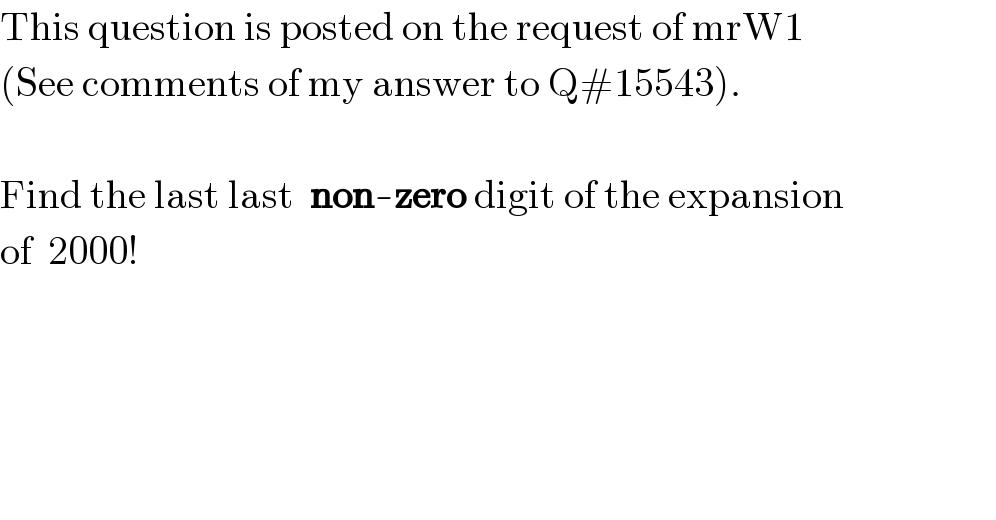
Question Number 15742 by RasheedSoomro last updated on 14/Jun/17

$$\mathrm{This}\:\mathrm{question}\:\mathrm{is}\:\mathrm{posted}\:\mathrm{on}\:\mathrm{the}\:\mathrm{request}\:\mathrm{of}\:\mathrm{mrW1}\:\:\:\:\:\:\:\:\:\:\:\:\:\:\:\:\:\:\:\:\:\:\:\: \\ $$$$\left(\mathrm{See}\:\mathrm{comments}\:\mathrm{of}\:\mathrm{my}\:\mathrm{answer}\:\mathrm{to}\:\mathrm{Q}#\mathrm{15543}\right). \\ $$$$ \\ $$$$\mathrm{Find}\:\mathrm{the}\:\mathrm{last}\:\mathrm{last}\:\:\boldsymbol{\mathrm{non}}-\boldsymbol{\mathrm{zero}}\:\mathrm{digit}\:\mathrm{of}\:\mathrm{the}\:\mathrm{expansion} \\ $$$$\mathrm{of}\:\:\mathrm{2000}! \\ $$
Commented by mrW1 last updated on 13/Jun/17

$$\mathrm{Thank}\:\mathrm{you}\:\mathrm{Mr}\:\mathrm{Rasheed}\:\mathrm{for}\:\mathrm{solving} \\ $$$$\mathrm{the}\:\mathrm{question}! \\ $$
Answered by RasheedSoomro last updated on 13/Jun/17

$$\:^{\bullet} \mathrm{2000}!\:\:\mathrm{has}\:\mathrm{as}\:\mathrm{many}\:\mathrm{ending}\:\mathrm{zeros} \\ $$$$\:\:\:\:\mathrm{as}\:\:\mathrm{many}\:\mathrm{times}\:\mathrm{10}\:\mathrm{is}\:\mathrm{factor}\:\mathrm{of}\:\mathrm{it}. \\ $$$$\:^{\bullet} \mathrm{10}\:\mathrm{is}\:\mathrm{as}\:\mathrm{many}\:\mathrm{times}\:\mathrm{factor}\:\mathrm{of}\:\mathrm{2000}! \\ $$$$\:\:\:\:\mathrm{as}\:\mathrm{many}\:\mathrm{times}\:\mathrm{5}\:\mathrm{is}\:\mathrm{factor}\:\mathrm{of}\:\:\mathrm{of}\:\:\mathrm{it}. \\ $$$$\:^{\bullet} \mathrm{5}\:\mathrm{is}\:\: \\ $$$$\:\:\:\:\:\:\:\:\:\:\:\left(\:\lfloor\frac{\mathrm{2000}}{\mathrm{5}}\rfloor+\lfloor\frac{\mathrm{2000}}{\mathrm{25}}\rfloor+\lfloor\frac{\mathrm{2000}}{\mathrm{125}}\rfloor+\lfloor\frac{\mathrm{2000}}{\mathrm{625}}\rfloor\:\right)\: \\ $$$$\:\:\:\:\:\:\:\:\:=\mathrm{400}+\mathrm{80}+\mathrm{16}+\mathrm{3}=\mathrm{499}\:\mathrm{times} \\ $$$$\:\:\:\:\:\:\:\:\:\:\:\:\:\:\:\:\:\:\:\:\:\:\mathrm{factor}\:\mathrm{of}\:\:\mathrm{2000}! \\ $$$$\mathrm{That}\:\mathrm{all}\:\mathrm{means}\:\mathrm{2000}!\:\mathrm{has}\:\mathrm{499}\:\mathrm{ending}\:\:\mathrm{0}'\mathrm{s} \\ $$$$\mathrm{and}\:\mathrm{if}\:\mathrm{p}=\frac{\mathrm{2000}!}{\mathrm{10}^{\mathrm{499}} }\:\mathrm{then}\:\mathrm{p}\:\mathrm{has}\:\mathrm{no}\:\mathrm{ending}\:\mathrm{0}. \\ $$$$\mathrm{And}\:\mathrm{how}\:\mathrm{is}\:\mathrm{this}\:\mathrm{related}\:\mathrm{to}\:\boldsymbol{\mathrm{last}}\:\boldsymbol{\mathrm{non}}-\boldsymbol{\mathrm{zero}}\:\boldsymbol{\mathrm{digit}} \\ $$$$\boldsymbol{\mathrm{of}}\:\:\mathrm{2000}!\:\:? \\ $$$$\mathrm{It}'\mathrm{s}\:\mathrm{as}\:\mathrm{that}\: \\ $$$$\:\:\:\:\:\:\:\boldsymbol{\mathrm{Last}}\:\boldsymbol{\mathrm{non}}-\boldsymbol{\mathrm{zero}}\:\boldsymbol{\mathrm{digit}}\:\boldsymbol{\mathrm{of}}\:\mathrm{2000}!\left(\mathrm{say}\:\mathrm{d}\right) \\ $$$$\:\:\:\:\:\:\:\:\:\:\:\:\:\:\:\:\:\:\:\:\:\:\:\:\:\:\:\:\:\:\:\:\:\:\:\:\:\:\:=\boldsymbol{\mathrm{unit}}\:\boldsymbol{\mathrm{digit}}\:\boldsymbol{\mathrm{of}}\:\mathrm{p}=\mathrm{2000}!/\mathrm{10}^{\mathrm{499}} \\ $$$$\:\:\:\mathrm{Hence}\:\mathrm{p}\equiv\mathrm{d}\left(\mathrm{mod}\:\mathrm{10}\right) \\ $$$$ \\ $$$$\mathrm{Now}, \\ $$$$\:\:\:\:\:\mathrm{2000}!=\left(\mathrm{1}...\mathrm{4}\right)\left(\mathrm{6}...\mathrm{9}\right)...\left(\mathrm{1996}...\mathrm{1999}\right)\left(\mathrm{5}.\mathrm{10}...\mathrm{2000}\right) \\ $$$$\:\:\:\:\:\:\:\:\:\:\:\:\:\:\:\:\:=\mathrm{5}^{\mathrm{400}} \overset{−\mathrm{400}\:\mathrm{brackets}−} {\left(\mathrm{1}...\mathrm{4}\right)\left(\mathrm{6}...\mathrm{9}\right)...\left(\mathrm{1996}...\mathrm{1999}\right)}.\mathrm{400}! \\ $$$$\:\:\:\:\:\:\mathrm{400}!=\left(\mathrm{1}...\mathrm{4}\right)\left(\mathrm{6}...\mathrm{9}\right)...\left(\mathrm{396}...\mathrm{399}\right)\left(\mathrm{5}.\mathrm{10}...\mathrm{400}\right) \\ $$$$\:\:\:\:\:\:\:\:\:\:\:\:\:\:\:\:=\mathrm{5}^{\mathrm{80}} \overset{−\mathrm{80}\:\mathrm{brackets}−} {\left(\mathrm{1}...\mathrm{4}\right)\left(\mathrm{6}...\mathrm{9}\right)...\left(\mathrm{396}...\mathrm{399}\right)}.\mathrm{80}! \\ $$$$\:\:\:\:\:\mathrm{80}!=\left(\mathrm{1}...\mathrm{4}\right)\left(\mathrm{6}...\mathrm{9}\right)...\left(\mathrm{76}...\mathrm{79}\right)\left(\mathrm{5}.\mathrm{10}..\mathrm{80}\right) \\ $$$$\:\:\:\:\:\:\:\:\:\:\:\:\:=\mathrm{5}^{\mathrm{16}} \overset{\mathrm{16}\:\mathrm{brackets}} {\left(\mathrm{1}...\mathrm{4}\right)\left(\mathrm{6}...\mathrm{9}\right)...\left(\mathrm{76}...\mathrm{79}\right)}.\mathrm{16}! \\ $$$$\:\:\:\:\mathrm{16}!=\left(\mathrm{1}...\mathrm{4}\right)\left(\mathrm{6}...\mathrm{9}\right)\left(\mathrm{11}...\mathrm{14}\right)\left(\mathrm{16}\right)\left(\mathrm{5}.\mathrm{10}.\mathrm{15}\right) \\ $$$$\:\:\:\:\:\:\:\:\:\:\:\:\:=\mathrm{5}^{\mathrm{3}} \left(\mathrm{1}...\mathrm{4}\right)\left(\mathrm{6}...\mathrm{9}\right)\left(\mathrm{11}...\mathrm{14}\right)\left\{\left(\mathrm{16}\right).\mathrm{3}!\right\} \\ $$$$\:\:\:\:\:\:\:\:\:\:\:\:\:=\mathrm{5}^{\mathrm{3}} \overset{\mathrm{3}\:\mathrm{brackets}} {\left(\mathrm{1}...\mathrm{4}\right)\left(\mathrm{6}...\mathrm{9}\right)\left(\mathrm{11}...\mathrm{14}\right)}\left(\mathrm{96}\right) \\ $$$$\mathrm{Total}\:\mathrm{499}\:\mathrm{brackets}\left(\mathrm{as}\:\mathrm{many}\:\mathrm{as}\:\mathrm{there}\:\mathrm{are}\:\mathrm{zeros}\right) \\ $$$$\mathrm{2000}!=\mathrm{5}^{\mathrm{499}} \left\{\left(\mathrm{1}...\mathrm{4}\right)\left(\mathrm{6}...\mathrm{9}\right)...\left(\mathrm{1996}...\mathrm{1999}\right)\right\} \\ $$$$\:\:\:\:\:\:\:\:\:\:\:\:\:\:\:\:\:\:\:\:\:×\left\{\left(\mathrm{1}...\mathrm{4}\right)\left(\mathrm{6}...\mathrm{9}\right)...\left(\mathrm{396}...\mathrm{399}\right)\right\} \\ $$$$\:\:\:\:\:\:\:\:\:\:\:\:\:\:\:\:\:\:\:\:\:\:\:\:\:\:\:×\left\{\left(\mathrm{1}...\mathrm{4}\right)\left(\mathrm{6}...\mathrm{9}\right)...\left(\mathrm{76}...\mathrm{79}\right)\right\} \\ $$$$\:\:\:\:\:\:\:\:\:\:\:\:\:\:\:\:\:\:\:\:\:\:\:\:\:\:\:\:\:\:\:\:\:×\left\{\left(\mathrm{1}...\mathrm{4}\right)\left(\mathrm{6}...\mathrm{9}\right)\left(\mathrm{11}...\mathrm{14}\right)\right\}\left(\mathrm{96}\right) \\ $$$$\:\:\mathrm{p}=\frac{\mathrm{2000}!}{\mathrm{2}^{\mathrm{499}} .\mathrm{5}^{\mathrm{499}} }=\left(\frac{\mathrm{1}}{\mathrm{2}^{\mathrm{499}} }\right)\left\{\left(\mathrm{1}...\mathrm{4}\right)\left(\mathrm{6}...\mathrm{9}\right)...\left(\mathrm{1996}...\mathrm{1999}\right)\right\} \\ $$$$\:\:\:\:\:\:\:\:\:\:\:\:\:\:\:\:\:\:\:\:\:\:\:\:\:\:\:\:\:\:\:\:\:\:\:\:\:\:×\left\{\left(\mathrm{1}...\mathrm{4}\right)\left(\mathrm{6}...\mathrm{9}\right)...\left(\mathrm{396}...\mathrm{399}\right)\right\} \\ $$$$\:\:\:\:\:\:\:\:\:\:\:\:\:\:\:\:\:\:\:\:\:\:\:\:\:\:\:\:\:\:\:\:\:\:\:\:\:\:\:\:\:\:\:×\left\{\left(\mathrm{1}...\mathrm{4}\right)\left(\mathrm{6}...\mathrm{9}\right)...\left(\mathrm{76}...\mathrm{79}\right)\right\} \\ $$$$\:\:\:\:\:\:\:\:\:\:\:\:\:\:\:\:\:\:\:\:\:\:\:\:\:\:\:\:\:\:\:\:\:\:\:\:\:\:\:\:\:\:\:\:\:\:\:×\left\{\left(\mathrm{1}...\mathrm{4}\right)\left(\mathrm{6}...\mathrm{9}\right)\left(\mathrm{11}...\mathrm{14}\right)\right\}\left(\mathrm{96}\right) \\ $$$$\:\mathrm{p}=\left\{\left(\frac{\mathrm{1}...\mathrm{4}}{\mathrm{2}}\right)\left(\frac{\mathrm{6}...\mathrm{9}}{\mathrm{2}}\right)...\left(\frac{\mathrm{1996}...\mathrm{1999}}{\mathrm{2}}\right)\right\} \\ $$$$\:\:\:\:\:\:\:\:\:\:\:\:\:×\left\{\left(\frac{\mathrm{1}...\mathrm{4}}{\mathrm{2}}\right)\left(\frac{\mathrm{6}...\mathrm{9}}{\mathrm{2}}\right)...\left(\frac{\mathrm{396}...\mathrm{399}}{\mathrm{2}}\right)\right\} \\ $$$$\:\:\:\:\:\:\:\:\:\:\:\:\:\:\:\:\:\:\:×\left\{\left(\frac{\mathrm{1}...\mathrm{4}}{\mathrm{2}}\right)\left(\frac{\mathrm{6}...\mathrm{9}}{\mathrm{2}}\right)...\left(\frac{\mathrm{76}...\mathrm{79}}{\mathrm{2}}\right)\right\} \\ $$$$\:\:\:\:\:\:\:\:\:\:\:\:\:\:\:\:\:\:\:\:\:\:\:\:\:\:×\left\{\left(\frac{\mathrm{1}...\mathrm{4}}{\mathrm{2}}\right)\left(\frac{\mathrm{6}...\mathrm{9}}{\mathrm{2}}\right)\left(\frac{\mathrm{11}...\mathrm{14}}{\mathrm{2}}\right)\right\}\left(\mathrm{96}\right) \\ $$$$\:\:\mathrm{Now},\:\:\mathrm{we}\:\mathrm{know}\:\mathrm{that}\:\mathrm{or}\:\mathrm{can}\:\mathrm{prove}\:\mathrm{that} \\ $$$$\:\:\:\:\:\:\:\:\:\:\:\:\frac{\left(\mathrm{5k}+\mathrm{1}\right)\left(\mathrm{5k}+\mathrm{2}\right)\left(\mathrm{5k}+\mathrm{3}\right)\left(\mathrm{5k}+\mathrm{4}\right)}{\mathrm{2}}\equiv\mathrm{2}\left(\mathrm{mod}\:\mathrm{10}\right) \\ $$
Commented by Tinkutara last updated on 13/Jun/17
![We have last non-zero digit of n! = 2^A × A! × B! where A = [(n/5)] and B = remainder when n is divided by 5. Last non-zero digit of 2000! = 2^(400) × 400! × 0! = 2^(400) × 400! Last non-zero digit of 400! = 2^(80) × 80! Last non-zero digit of 80! = 2^(16) × 16! Last non-zero digit of 16! = 2^3 × 3! × 1! = 48 ≡ 8 Last non-zero digit of 2000! ≡ 6 × 400! = 6 × 6 × 80! ≡ 6 × 80! ≡ 6 × 6 × 16! ≡ 6 × 16! ≡ 6 × 8 ≡ 8 Similarly last non-zero digit of 1000! = 2^(200) × 200! Last non-zero digit of 200! = 2^(40) × 40! Last non-zero digit of 40! = 2^8 × 8! Last non-zero digit of 8! = 2^1 × 1! × 3! = 2 × 6 ≡ 2 Last non-zero digit of 1000! = 6 × 200! = 6 × 6 × 6 × 2 ≡ 2](Q15758.png)
$$\mathrm{We}\:\mathrm{have}\:\mathrm{last}\:\mathrm{non}-\mathrm{zero}\:\mathrm{digit}\:\mathrm{of}\:{n}! \\ $$$$=\:\mathrm{2}^{\mathrm{A}} \:×\:\mathrm{A}!\:×\:\mathrm{B}! \\ $$$$\mathrm{where}\:\mathrm{A}\:=\:\left[\frac{{n}}{\mathrm{5}}\right]\:\mathrm{and}\:\mathrm{B}\:=\:\mathrm{remainder} \\ $$$$\mathrm{when}\:{n}\:\mathrm{is}\:\mathrm{divided}\:\mathrm{by}\:\mathrm{5}. \\ $$$$\mathrm{Last}\:\mathrm{non}-\mathrm{zero}\:\mathrm{digit}\:\mathrm{of}\:\mathrm{2000}! \\ $$$$=\:\mathrm{2}^{\mathrm{400}} \:×\:\mathrm{400}!\:×\:\mathrm{0}!\:=\:\mathrm{2}^{\mathrm{400}} \:×\:\mathrm{400}! \\ $$$$\mathrm{Last}\:\mathrm{non}-\mathrm{zero}\:\mathrm{digit}\:\mathrm{of}\:\mathrm{400}! \\ $$$$=\:\mathrm{2}^{\mathrm{80}} \:×\:\mathrm{80}! \\ $$$$\mathrm{Last}\:\mathrm{non}-\mathrm{zero}\:\mathrm{digit}\:\mathrm{of}\:\mathrm{80}! \\ $$$$=\:\mathrm{2}^{\mathrm{16}} \:×\:\mathrm{16}! \\ $$$$\mathrm{Last}\:\mathrm{non}-\mathrm{zero}\:\mathrm{digit}\:\mathrm{of}\:\mathrm{16}! \\ $$$$=\:\mathrm{2}^{\mathrm{3}} \:×\:\mathrm{3}!\:×\:\mathrm{1}!\:=\:\mathrm{48}\:\equiv\:\mathrm{8} \\ $$$$\mathrm{Last}\:\mathrm{non}-\mathrm{zero}\:\mathrm{digit}\:\mathrm{of}\:\mathrm{2000}! \\ $$$$\equiv\:\mathrm{6}\:×\:\mathrm{400}!\:=\:\mathrm{6}\:×\:\mathrm{6}\:×\:\mathrm{80}!\:\equiv\:\mathrm{6}\:×\:\mathrm{80}! \\ $$$$\equiv\:\mathrm{6}\:×\:\mathrm{6}\:×\:\mathrm{16}!\:\equiv\:\mathrm{6}\:×\:\mathrm{16}!\:\equiv\:\mathrm{6}\:×\:\mathrm{8}\:\equiv\:\mathrm{8} \\ $$$$\mathrm{Similarly}\:\mathrm{last}\:\mathrm{non}-\mathrm{zero}\:\mathrm{digit}\:\mathrm{of}\:\mathrm{1000}! \\ $$$$=\:\mathrm{2}^{\mathrm{200}} \:×\:\mathrm{200}! \\ $$$$\mathrm{Last}\:\mathrm{non}-\mathrm{zero}\:\mathrm{digit}\:\mathrm{of}\:\mathrm{200}! \\ $$$$=\:\mathrm{2}^{\mathrm{40}} \:×\:\mathrm{40}! \\ $$$$\mathrm{Last}\:\mathrm{non}-\mathrm{zero}\:\mathrm{digit}\:\mathrm{of}\:\mathrm{40}! \\ $$$$=\:\mathrm{2}^{\mathrm{8}} \:×\:\mathrm{8}! \\ $$$$\mathrm{Last}\:\mathrm{non}-\mathrm{zero}\:\mathrm{digit}\:\mathrm{of}\:\mathrm{8}! \\ $$$$=\:\mathrm{2}^{\mathrm{1}} \:×\:\mathrm{1}!\:×\:\mathrm{3}!\:=\:\mathrm{2}\:×\:\mathrm{6}\:\equiv\:\mathrm{2} \\ $$$$\mathrm{Last}\:\mathrm{non}-\mathrm{zero}\:\mathrm{digit}\:\mathrm{of}\:\mathrm{1000}! \\ $$$$=\:\mathrm{6}\:×\:\mathrm{200}!\:=\:\mathrm{6}\:×\:\mathrm{6}\:×\:\mathrm{6}\:×\:\mathrm{2}\:\equiv\:\mathrm{2} \\ $$
Commented by RasheedSoomro last updated on 13/Jun/17

$$\mathrm{I}\:\mathrm{don}'\mathrm{t}\:\mathrm{know}\:\mathrm{that}\:\mathrm{formula}! \\ $$
Commented by RasheedSoomro last updated on 13/Jun/17
![Continue from my above answer Sorry that there was no space and my few lines couldn′t be included in the above answer. I write them below So each bracket is congruentto 2(mod 10): ((∗.∗.∗.∗)/2)≡2(mod 10) [499 congruences).....(i) 96≡6(mod 10).......................................(ii) (i)×(ii): p≡2^(499) .6(mod 10) p≡8.6(mod 10) [∵ 2^(4k+3) ≡8]] p≡8(mod 10) Hence the last non-zero digit of 2000!=8](Q15771.png)
$$\mathrm{Continue}\:\mathrm{from}\:\mathrm{my}\:\:\mathrm{above}\:\mathrm{answer} \\ $$$$\mathrm{Sorry}\:\mathrm{that}\:\mathrm{there}\:\mathrm{was}\:\mathrm{no}\:\mathrm{space}\:\mathrm{and}\:\mathrm{my}\:\mathrm{few}\:\mathrm{lines}\: \\ $$$$\mathrm{couldn}'\mathrm{t}\:\mathrm{be}\:\mathrm{included}\:\mathrm{in}\:\mathrm{the}\:\mathrm{above}\:\mathrm{answer}. \\ $$$$\mathrm{I}\:\mathrm{write}\:\mathrm{them}\:\mathrm{below} \\ $$$$\:\:\:\:\:\:\:\:\:\:\:\mathrm{So}\:\mathrm{each}\:\mathrm{bracket}\:\mathrm{is}\:\mathrm{congruentto}\:\mathrm{2}\left(\mathrm{mod}\:\mathrm{10}\right): \\ $$$$\:\:\:\:\:\:\:\:\:\:\:\:\frac{\ast.\ast.\ast.\ast}{\mathrm{2}}\equiv\mathrm{2}\left(\mathrm{mod}\:\mathrm{10}\right)\:\:\:\left[\mathrm{499}\:\mathrm{congruences}\right).....\left(\mathrm{i}\right) \\ $$$$\:\:\:\:\:\:\:\:\:\:\:\:\:\:\:\:\:\mathrm{96}\equiv\mathrm{6}\left(\mathrm{mod}\:\mathrm{10}\right).......................................\left(\mathrm{ii}\right) \\ $$$$\:\left(\mathrm{i}\right)×\left(\mathrm{ii}\right):\:\:\mathrm{p}\equiv\mathrm{2}^{\mathrm{499}} .\mathrm{6}\left(\mathrm{mod}\:\mathrm{10}\right) \\ $$$$\left.\:\:\:\:\:\:\:\:\mathrm{p}\equiv\mathrm{8}.\mathrm{6}\left(\mathrm{mod}\:\mathrm{10}\right)\:\:\:\left[\because\:\mathrm{2}^{\mathrm{4k}+\mathrm{3}} \equiv\mathrm{8}\right]\right] \\ $$$$\:\:\:\:\:\:\:\:\mathrm{p}\equiv\mathrm{8}\left(\mathrm{mod}\:\mathrm{10}\right)\:\:\: \\ $$$$\mathrm{Hence}\:\mathrm{the}\:\mathrm{last}\:\mathrm{non}-\mathrm{zero}\:\mathrm{digit}\:\mathrm{of}\:\mathrm{2000}!=\mathrm{8} \\ $$
Commented by mrW1 last updated on 13/Jun/17

$$\mathrm{Great}\:\mathrm{job}\:\mathrm{done}! \\ $$
Commented by mrW1 last updated on 13/Jun/17

$$\mathrm{To}\:\mathrm{tinkutara}: \\ $$$$\mathrm{Your}\:\mathrm{solution}\:\mathrm{is}\:\mathrm{fantastic}! \\ $$$$\mathrm{How}\:\mathrm{did}\:\mathrm{you}\:\mathrm{get}\:\mathrm{the}\:\mathrm{solution}?\:\mathrm{Is}\:\mathrm{it}\:\mathrm{a} \\ $$$$\mathrm{method}\:\mathrm{developed}\:\mathrm{by}\:\mathrm{yourself}?\:\mathrm{Can} \\ $$$$\mathrm{you}\:\mathrm{supply}\:\mathrm{more}\:\mathrm{details}\:\mathrm{about}\:\mathrm{the} \\ $$$$\mathrm{method}? \\ $$
Commented by Tinkutara last updated on 14/Jun/17

$$\mathrm{I}\:\mathrm{checked}\:\mathrm{the}\:\mathrm{method}\:\mathrm{on}\:\mathrm{internet}.\:\mathrm{You} \\ $$$$\mathrm{can}\:\mathrm{type}\:``\mathrm{last}\:\mathrm{non}-\mathrm{zero}\:\mathrm{digit}\:\mathrm{of}\:\mathrm{a} \\ $$$$\mathrm{factorial}''\:\mathrm{on}\:\mathrm{Google}\:\mathrm{to}\:\mathrm{get}\:\mathrm{the}\:\mathrm{formula} \\ $$$$\mathrm{but}\:\mathrm{I}\:\mathrm{don}'\mathrm{t}\:\mathrm{know}\:\mathrm{its}\:\mathrm{proof}. \\ $$
Commented by mrW1 last updated on 14/Jun/17

$$\mathrm{thanks}! \\ $$
